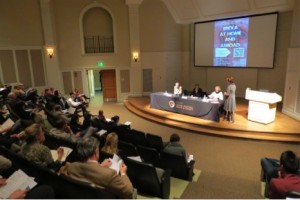The symposium, Ebola: At Home and Abroad, held Feb. 12-13 demonstrated the importance of a liberal arts education. Even though Ebola is a virus, attendees learned that to effectively respond to the outbreak requires knowledge of history, economics, law, bioethics, as well as biology, medicine and other disciplines. Prior to the symposium, associate teaching professor Pat Lord’s virology students studied the Ebola virus to prepare background knowledge and a quiz made available online.
On the first night of the symposium, with more than 125 undergraduate, graduate, and medical students, professors, staff, and community members present, Assistant Professor of History Nate Plageman began by challenging everyone to stop thinking of Africa as “one-dimensional.” He highlighted assumptions about race that permeated Ebola news coverage.
Continuing the discussion, Christine Bishop, M.D., Wake Forest School of Medicine (WFSM), discussed healthcare-related concerns including protection for healthcare workers and decisions about which treatments to provide, which are affected by a country’s financial resources. Jon Abramson, M.D., also from WFSM and chair of the World Health Organization (WHO) Strategic Advisory Group of Experts on Immunization (SAGE), noted that while an Ebola vaccine has been proven safe and effective in animal trials, sometimes “mice lie” and what works in animals doesn’t always work in humans. Wake Forest School of Law professor Christine Coughlin examined U.S. quarantine law, pointing out that every state has different laws, many of which have not been updated for more than 50 years.
The symposium’s second night was also well attended with more than 65 people present and featured guest, Dr. Adam Bjork, a Centers for Disease Control and Prevention epidemiologist. Bjork worked in Liberia in September of 2014 and discussed the importance of contact tracing to help contain the spread of the infection.
Ajay Patel, professor of finance, discussed the economic impact of the Ebola outbreak which was even more compelling after Bjork shared pictures from Liberia and the difficulties faced with transportation and facilities. Professor Nancy King, WFSM and co-director of the Center for Bioethics, Health and Society, summarized the wide range of ethical issues related to addressing Ebola in patient care, research, the media, policy and law.
Responding to Ebola effectively and preventing future outbreaks requires a multi-disciplinary effort that reflects a wide-ranging understanding of the many factors that contribute to the spread of disease. Ebola: At Home & Abroad was sponsored by the Center for Bioethics, Health and Society, the Department of Biology, and the Center for Enterprise Research and Education.
Recent Posts
-
May 1, 2024
-
April 30, 2024
-
April 30, 2024

